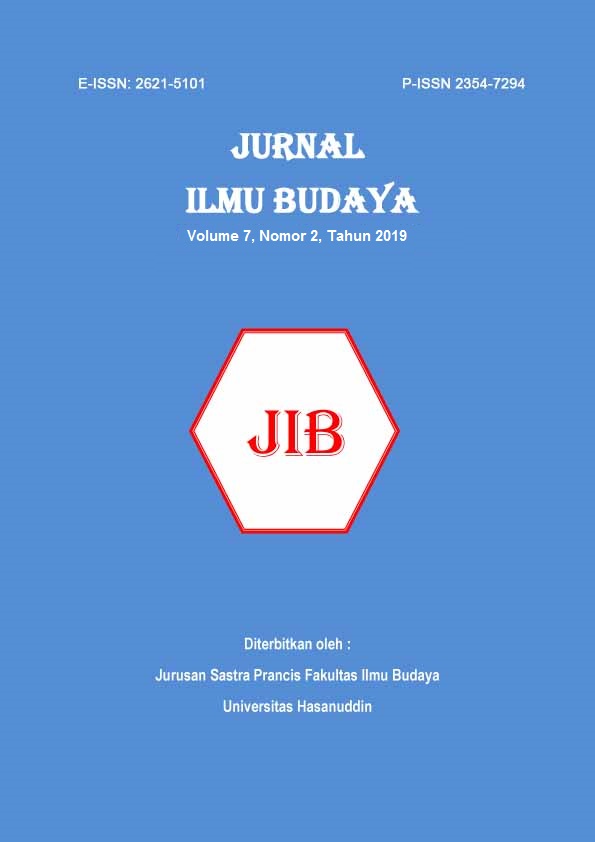SOCIETY-BASED ENGLISH COMMUNITY (SOBAT): EFL LEARNERS’ STRATEGY IN LEARNING AND PRACTICING ENGLISH OUTSIDE THE WALLS
Keywords:
EFL learners, learning strategy, society based English, English communityAbstract
As for most Indonesian learners of English, classroom is the only place to learn and to practice English either with classmates or teachers. However, they do not to have plenty of opportunities to practice in English when they leave the classrooms. This has encouraged many of the learners seek strategies that allow them to learn and to use English outside the walls of the classrooms. This paper aims to introduce an approach which can be used as an English learning strategy for EFL learners that they can learn and practice English outside the classroom. This approach is hereinafter referred to as the Society-Based English Community (SOBAT). Therefore, the discussion of this paper focuses on three main points. First, it presents a theoretical discussion on the SOBAT concept. Second, it introduces procedures that can be used by EFL learners to establish SOBAT. Third, it outlines several proposed activities that can be carried out in this community. Forming this community is believed to be able to provide four main benefits: providing the EFL learners with plenty of opportunities not only to learn but also to practice English collectively, forming a habit of using English as intensive as possible for the sake of establishing a community of English whose members actively communicate in English and use English the first lingua franca, giving the members a chance to become interactive, creative, active and effective EFL learners, developing their assertiveness, critical thinking, leadership, initiative as well as inclusiveness by taking a part in discussions and debates on important issues of this country.References
Alwasilah, C. (2007, April). Redesigning Indonesian Course in the undergraduate curriculum: The Indonesian case. In ASAIHIL Conference, Lingnan University, Hong Kong.
Andi, K., & Arafah, B. (2017). Using needs analysis to develop English teaching materials in initial speaking skills for Indonesian college students of English. The Turkish Online Journal of Design, Art and Communication (TOJDAC), Special Edition, 419-436.
Au, K. H. (1998). Social constructivism and the school literacy learning of students of diverse backgrounds. Journal of literacy research, 30(2), 297-319.
Bahar, A. K. (2013). The Communicative Competence-Based English Language Teaching. Yogyakarta: TrustMedia.
Bahar, K. (2013). The Communicative Grammar Translation Method: An Integrated Method of CLT and GT for Teaching English Communicatively and Accurately. Yogyakarta: Trustmedia.
Bahar, K. (2014). Interactional Speaking a Guide to enchance Natural Communication Skills in English. Yogyakarta: TrustMedia Ethnologue.
Bahar, A.K (2014). Transactional Speaking Skills: A Guide to Improve Transactional Exchange Skills in English for Group Discussions (GD) and Interviews. Gowa: Gunadarma Ilmu.
Ellis, R. (1992). Second language acquisition & language pedagogy . Multilingual Matters Ltd: United Kingdom.
Hamra, A., & Syatriana, E. (2015). Developing a model of teaching reading comprehension for EFL students. TEFLIN journal, 21(1), 27-40.
Ismail, N. S., & Tahir, I. M. (2011). English Camp Activities: A Strategy to Enhance Students' English Proficiency. Studies in Literature and Language, 2(3), 61.
Kaharuddin, N. (2014). The problems of Indonesian college EFL Learners in Listening Comprehension. Jurnal ilmu budaya, 2(2).
Kaharuddin, Yassi, A.H, Arafah, B. (2014). Communicative Competence-Based Syllabus Design for Initial English Speaking Skills. International Journal of Enhanced Research in Educational Development (IJERED), 2 (3), 64-83.
Kaharuddin, K. (2016). Detecting Errors in English Made by Intermediate Indonesian Learners of English in English Department Students of STAIN Parepare. Kuriositas: Media Komunikasi Sosial Keagamaan, 9(1), 1-19.
Kaharuddin, A., & Latif, I. (2017). The Essential of Discourse Analysis for Teaching English as a Foreign Language, Trust Media Publishing: Yogyakarta
Kaharuddin, A. (2018). The communicative grammar translation method: a practical method to teach communication skills of English. ETERNAL (English, Teaching, Learning, and Research Journal), 4(2), 232-254.
Kaharuddin, A. (2019). The Power of English: Recognizing and Utilizing the Tremendous Impact of the English Language on the Community. English Language Teaching for EFL Learners, 1(1), 39-48.
Knagg,J. (2014). Report from TESOL 2014: 1.5 Billion English Learners Worldwide, Retrieved from https://www.internationalteflacademy.com/blog/bid/205659/report-from-tesol-2014-1-5-billion-english-learners-worldwide
Lowenberg, P. H. (1991). English as an additional language in Indonesia. World Englishes, 10(2), 127-138.
Malu, K. F., & Smedley, B. (2016). Community-Based English Clubs: English Practice and Social Change outside the Classroom. In English Teaching Forum, 54 (3), 10-23.
McMillan, D. W., & Chavis, D. M. (1986). Sense of community: A definition and theory. Journal of community psychology, 14(1), 6-23.
Nur, M. R., & Madkur, A. (2014). Teachers’Voices on the 2013 Curriculum for English Instructional Activities. IJEE (Indonesian Journal of English Education), 1(2), 119-134.
Renandya, W. A. (2013). Essential factors affecting EFL learning outcomes. English Teaching, 68(4), 23-41.
Saleh, S. M., & Baqutayan, S. M. (2012). What is the Islamic Society. International Review of Social Sciences and Humanities, 2(2), 113-119.
Sargsyan, M., & Kurghinyan, A. (2016). The use of English language outside the classroom. Journal of Language and Cultural Education, 4(1), 29-47.
Stebbins, R. A. (1987). Sociology: The study of society. Harpercollins: New York
Sulistiyo, U. (2016). Learning English as a Foreign Language in an Indonesian University: A Study Of Non-English Department Students’ preferred Activities Inside And Outside The Classroom. Indonesian Journal of English Teaching, 5(1), 1-26.
Syatriana, E. (2013). A Model of Creating Instructional Materials Based on the School Curriculum for Indonesian Secondary Schools.
Woodward, A. R., & Mair, V. H. (2008). A Survey of Li Yang Crazy English. Sino-Platonic Papers. Department of East Asian Languages and Civilizations.
Yassi, A. H. Kaharuddin (2018). Syllabus Design Of English Language Teaching. Jakarta: Prenada Media.
Downloads
Published
Issue
Section
License
Copyright (c) 2019 JURNAL ILMU BUDAYA

This work is licensed under a Creative Commons Attribution-NonCommercial 4.0 International License.


